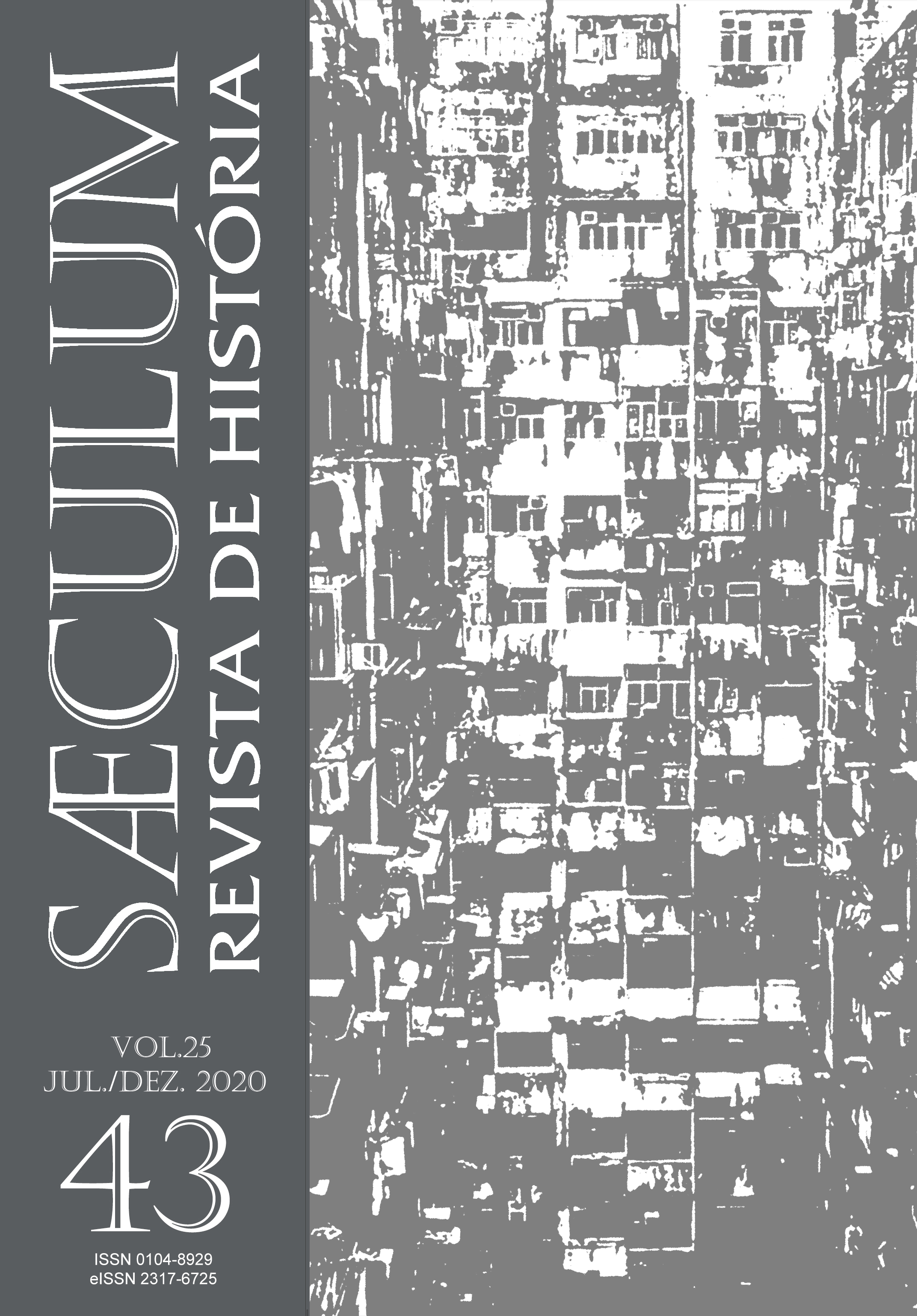Black American Colonization in the Brazilian Amazon
colored bodies in motion
DOI :
https://doi.org/10.22478/ufpb.2317-6725.2020v25n43.54572Mots-clés :
Black colonization, Amazon, Amalgamation, African diasporaRésumé
In the 1860s, when post-emancipation debates reached transnational significance, Brazil and the United States were the only two countries in the Americas where slavery was still legal. While Brazil was recognized as a place where “colour is no obstacle to advancement” (CHRISTIE, 1865, 78), the United States witnessed the emergence of the belief that “the races cannot live together in a state of freedom” (WEBB, 1853). Considering that context, the fortuitous encounter of a New York Times article from 1862 aroused my curiosity for it reported a project to transplant Afro-descendants from the United States to the Brazilian Amazon. Such a project remained virtually ignored by the Brazilian historiography, except for the book published by Nícia Vilela Luz in 1968, denouncing the American intentions to colonize the Amazon. Although the so-called “negro colonization” project never yielded an official proposition to the Brazilian government, it still deserves examination. I argue that, in the present context of global exchanges and migrations, this historical event gains new relevance. The intention of transferring an entire category of the population from one national territory to another raises questions about citizenship and national sovereignty. At the same time, it opens the opportunity for a transnational approach that can illuminate otherwise unseen aspects of migrations.
Téléchargements
Références
ALLEN, Austin. Origins of the Dred Scott Case: Jacksonian Jurisprudence and the Supreme Court, 1837-1857. Athens, Ga: University of Georgia Press, 2006.
ALLEN, Peter. The Cambridge Apostles: The Early Years. Cambridge: Cambridge University Press, 1978.
AZEVEDO, Célia Maria Marinho de. A recusa da “raça”: anti-racismo e cidadania no Brasil dos anos 1830. Horizontes Antropológicos, Porto Alegre, v. 11, n. 24, p. 297-320, dez. 2005.
BENNETT, Lerone. Forced into Glory: Abraham Lincoln’s White Dream. Chicago: Johnson Publishing Company, 2000.
BETHELL, Leslie. Brazil: Essays on History and Politics. London: School of Advanced Study, University of London, 2018.
BURIN, Eric. Slavery and the Peculiar Solution: A History of the American Colonization Society. Gainesville: UPF, 2003.
CHALHOUB, Sidney. The Precariousness of Freedom in a Slave Society (Brazil in the Nineteenth Century). International Review of Social History, v. 56, n. 3, p. 405-439, 2011.
CROUTHAMEL, James L.. James Watson Webb: Mercantile Editor. New York History 41, n. 4, p. 400-422, 1960.
DANTAS, Mariana L. R. and LIBBY, Douglas C.. “Families, Manumission, and Freed People in Urban Minas Gerais in the Era of Atlantic Abolitionism.” International Review of Social History 65, n. S28, p. 117-144, 2020.
DAWSEY, Cyrus B. and DAWSEY, James M., eds. The Confederados: Old South Immigrants in Brazil. Alabama: University of Alabama Press, 1998.
DOUMA, Michael J. The Lincoln Administration’s Negotiations to Colonize African Americans in Dutch Suriname. Civil War History, v. 61, n. 2, p. 111-137, 2015.
EVERILL, Bronwen. ‘Destiny Seems to Point Me to that Country’: Early Nineteenth-Century African American Migration, Emigration, and Expansion. Journal of Global History, v 7, n. 1, p. 53-77, 2012.
FIKES Jr., Robert. U.S. Blacks’ Perceptions, Experiences, and Scholarship regarding Central and South America – 1822-1959. The Negro Educational Review, v. 57, n. 3-4, p. 171-187, 2006.
GOMES, Tiago de Melo. Problemas no paraíso: a democracia racial brasileira frente à imigração afro-americana (1921). Estudos Afro-Asiáticos, v. 25, n. 2, p. 307-331, 2003.
GREGORY, James N.. Southern Diaspora: How the Great Migrations of Black and White Southerners Transformed America. Chapel Hill: The University of North Carolina Press, 2005.
HILL, Lawrence F.. Diplomatic Relations between the United States and Brazil. Durham, N.C: Duke University Press, 1932.
HOLANDA, Sérgio Buarque de. Livro dos prefácios. São Paulo: Companhia das Letras, 2017.
HORNE, Gerald. The Deepest South: The United States, Brazil, and the African Slave Trade. New York: New York University Press, 2007.
HUNT, Gaillard. William Thornton and Negro Colonization. Massachusetts: The Society, 1921.
JARNAGIN, Laura. A Confluence of Transatlantic Networks: Elites, Capitalism, and Confederate Migration to Brazil. Alabama: University of Alabama Press, 2008.
JONES, Martha S. Birthright Citizens: A History of Race and Rights in Antebellum America Cambridge University Press, 2018.
KODAMA, Kaori. Os debates pelo fim do tráfico no periódico O Philantropo (1849-1852) e a formação do povo: doenças, raça e escravidão. Revista Brasileira de História, São Paulo, v. 28, n. 56, p. 407-430, 2008.
LUZ, Nícia Vilela. A Amazônia para os negros americanos. Rio de Janeiro: Saga.1968.
LUZ, Nícia Vilela. A Monarquia Brasileira e as Repúblicas Americanas. Journal of Inter-American Studies, v. 8, n. 3, p. 358-370, ul. 1966.
MATOS, Odilon Nogueira de. Resenha de: A Amazônia Para Os Negros Americanos: As Origens De Uma Controvérsia Internacional. Revista de História 38, n. 78, p. 502-504, 1969.
PALM, Paulo Roberto. A abertura do rio Amazonas à navegação internacional e o parlamento brasileiro. Brasília: Fundação Alexandre de Gusmão, 2009.
RE, Henrique Antonio. Uma missão abolicionista britânica no Brasil e as relações entre a British and Foreign Anti-Slavery Society e a Sociedade contra o Tráfico de Africanos e Promotora da Colonização e Civilização dos Indígenas. Almanack, Guarulhos, n. 15, p. 293-317, Apr. 2017
REIS, João José. “The Malê Revolt” The Brazil Reader: History, Culture, Politics, edited by James N. Green, et al., Duke University Press, 2019.
SILVA, Angela Fileno. ‘Que eu vou na terra dos negros’: circularidades atlânticas e a comunidade brasileira na África. Tese (Dissertação em História). USP, 2010. https://www.teses.usp.br/teses/disponiveis/8/8138/tde-19082011-105508/en.php
SOARES, Álvaro Teixeira. “Limites do Brasil na Amazônia: Densificação Demográfica e Econômica das Fronteiras. Ação Do Exército, Marinha E Aeronáutica”. Revista Brasileira de Cultura, v. 13, n. 2, p. 59-85, jan./mar. 1970.
STERNHELL, Yael A.. Routes of War: The World of Movement in the Confederate South. Cambridge: Harvard University Press, 2012.
STROM, Sharon Hartman and WEAVER, Frederick Stirton. Confederates in the Tropics: Charles Swett’s Travelogue. Jackson: University Press of Mississippi, 2011.
TANNENBAUM, Frank. Slave and Citizen: The Negro in the Americas. New York: Vintage Books, 1946.
TAYLOR, Nikki. Reconsidering the ‘Forced’ Exodus of 1829: Free Black Emigration from Cincinnati, Ohio to Wilberforce, Canada. The Journal of African American History 87, no. 3 (2002): 283-302.
TYLER-MCGRAW, Marie. An African Republic: Black and White Virginians in the Making of Liberia. Chapel Hill: University of North Carolina Press, 2007.













